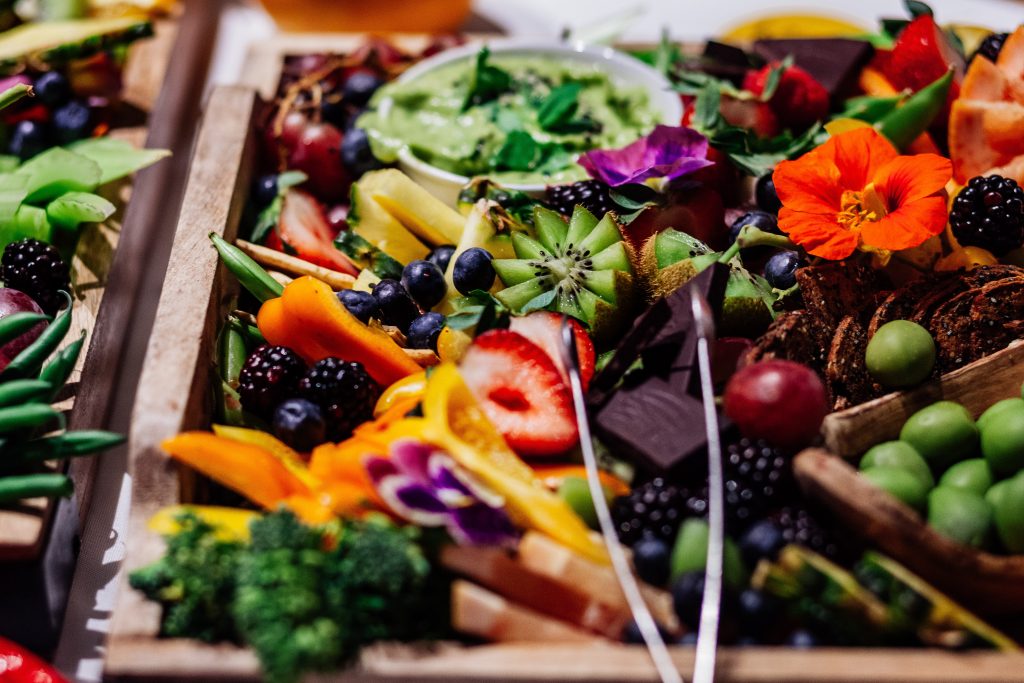Polyphenols: What They Are and Why You Need Them!

What are Polyphenols?
Polyphenols are chemicals found in plant foods, especially herbs and spices, fruits, vegetables, nuts, seeds, and beverages such as tea and coffee. They are produced naturally to protect the plant against ultraviolet radiation and other threats such as pests. Therefore, it makes sense that the compounds designed to protect against damage and death of a plant would also lend protective benefits to the person who consumes them! When it comes to food, polyphenols create a bitter flavor while also contributing to their beautiful colors, aromas, and oxidative stability.
Polyphenols can be broken down into the following groups based on their chemical structure (a more comprehensive list of top polyphenol-rich foods can be found at the bottom of this article):
- Flavonoids: berries, dark-colored vegetables, spices, nuts, dark chocolate, and soy
- Phenolic acids: onions, olives, spices, and cocoa
- Stilbenes: resveratrol in wine
- Lignans: flaxseed meal
A small percentage (5 to 10%) of polyphenols are absorbed in the small intestine and the rest are broken down by our gut bacteria in the colon. That is where they express their important benefits.
What are the Benefits of Polyphenols?
Source: Plant polyphenols as dietary antioxidants in human health and disease; Kanti Bhooshan Pandey, Syed Ibrahim Rizvi; Oxid Med Cell Longev. 2009 Nov-Dec; 2(5): 270–278.
There is excellent research that strongly suggests following a diet high in polyphenols protects against the development of various cancers, diabetes, oxidative stress/premature aging, cardiovascular disease, infections, asthma, hypertension, osteoporosis, and neurodegenerative diseases. How does it do this? There are many mechanisms at play here, but one key reason is the relationship between polyphenols and the gut microbiome.
As we uncover more about the incredible gut microbiome, we better understand the link between polyphenols and health. Polyphenols and gut bacteria work together to improve the health of the gut as well as the entire body. For example, gut microbes impact the bioavailability of polyphenols, or the amount that actually gets absorbed and is able to have a positive impact. They also act as prebiotics in the gut, meaning they help to feed and increase the amount of healthy bacteria, such as Akkermansia muciniphila. At the same time, certain polyphenols can inhibit the growth of potentially pathogenic bacteria such as Staphylococcus and Salmonella. This symbiotic relationship can help protect against gastrointestinal disorders and pathogens, it can strengthen the intestinal epithelial tight cell junctions (protect against or help to reverse leaky gut), and modulate the immune system keeping inflammation at bay.
Polyphenols, Phytochemicals, and Antioxidants: What’s the Connection?
People often ask me about the difference between antioxidants, polyphenols, and phytochemicals. Let’s see how they are all connected:
There are more than 500 known polyphenols, and collectively they are known as phytochemicals. Phytochemicals are biologically active compounds of plant origin that play a role in the growth of and defense against pathogens and threats to the plant.
Antioxidant is defined as a substance that reduces damage due to oxygen (oxidative stress) in a living organism. Left unchecked, oxidative stress damages our cells, proteins, and DNA resulting in many conditions such as cardiovascular disease, autoimmune conditions, and type 2 diabetes. Several things can cause oxidative stress such as cigarette smoke, stress, and rancid vegetable oils. However, one key reason for excess oxidative stress is a lack of antioxidants in the diet, and that’s where polyphenols come in.
Although it has recently been shown that polyphenols do not directly act as antioxidants, they protect against oxidative stress by playing a role in cell signaling and inflammation, insulin signaling/reducing blood sugar, and helping regulate the body’s natural antioxidant system. Additionally, many foods high in polyphenols also tend to be high in antioxidants.
Top Dietary Sources of Polyphenols
As you can see, there are many reasons to get more polyphenol-rich foods in your diet, but let’s not forget one of the best reasons to increase your intake: their beauty and taste! These foods tend to be deeply colored with complex flavor profiles that can enhance everything from savory to sweet dishes. In fact, the most concentrated sources of polyphenols are found in herbs and spices, so don’t be afraid to experiment with these in the kitchen! You can also venture into the spice-centric world of Indian, Moroccan, Mexican, Ethiopian, and African cuisine, the perfect blend of art and science.
Here are some of the top sources of polyphenols:
Herbs/spices:
- Cloves
- Dried peppermint
- Star anise
- Cocoa powder
- Mexican oregano
Fruit:
- Black elderberries
- Wild blueberries
- Blackcurrant
- Black olives
- Plums
Vegetables:
- Artichokes
- Red chicory
- Red onions
- Spinach
- Shallot
Nuts and Seeds:
- Flaxseed meal
- Chestnuts
- Hazelnuts
- Pecans
- Almonds
Beverages:
- Filtered coffee
- Red wine
- Green tea
I hope you get inspired to include more delicious polyphenol-rich foods in your diet. Not only will this one simple step create more diversity and flavor in your dishes, but it will improve multiple aspects of your health all at once!


